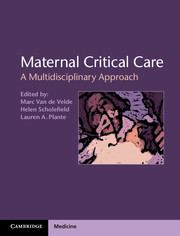Book contents
- Maternal Critical Care
- Maternal Critical Care
- Copyright page
- Dedication
- Contents
- Contributors
- Preface
- Section 1 General non-medical considerations
- Section 2 General medical considerations
- Section 3 Special critical care tools and techniques
- Section 4 The pregnant patient with coexisting disease
- Chapter 23 Cardiovascular disease
- Chapter 24 Respiratory disease
- Chapter 25 Thromboembolism
- Chapter 26 Neurological disease and neurological catastrophes
- Chapter 27 Acute kidney injury in pregnancy and critical care emergencies
- Chapter 28 Cancer
- Chapter 29 Endocrine disorders
- Chapter 30 Acute abdomen
- Chapter 31 Sepsis
- Chapter 32 Trauma
- Chapter 33 Malaria, bites, and stings during pregnancy
- Chapter 34 Pregnancy and liver disease
- Chapter 35 Autoimmune disease in pregnancy
- Section 5 Serious problems related to pregnancy
- Index
Chapter 33 - Malaria, bites, and stings during pregnancy
from Section 4 - The pregnant patient with coexisting disease
Published online by Cambridge University Press: 05 July 2013
- Maternal Critical Care
- Maternal Critical Care
- Copyright page
- Dedication
- Contents
- Contributors
- Preface
- Section 1 General non-medical considerations
- Section 2 General medical considerations
- Section 3 Special critical care tools and techniques
- Section 4 The pregnant patient with coexisting disease
- Chapter 23 Cardiovascular disease
- Chapter 24 Respiratory disease
- Chapter 25 Thromboembolism
- Chapter 26 Neurological disease and neurological catastrophes
- Chapter 27 Acute kidney injury in pregnancy and critical care emergencies
- Chapter 28 Cancer
- Chapter 29 Endocrine disorders
- Chapter 30 Acute abdomen
- Chapter 31 Sepsis
- Chapter 32 Trauma
- Chapter 33 Malaria, bites, and stings during pregnancy
- Chapter 34 Pregnancy and liver disease
- Chapter 35 Autoimmune disease in pregnancy
- Section 5 Serious problems related to pregnancy
- Index
Summary
Keywords
- Type
- Chapter
- Information
- Maternal Critical CareA Multidisciplinary Approach, pp. 367 - 378Publisher: Cambridge University PressPrint publication year: 2013



